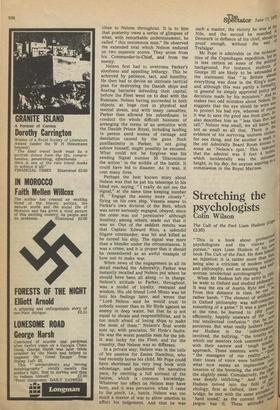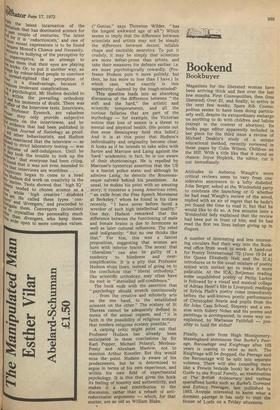Stretching the psychologists
Colin Wilson
and philosophy, and an amusing atlu £2.95) pursue," says Liam Hudson of hi i an injustice; it is rather more than ;lice being also a criticism of modern Sic;e11. written intellectual autobiographY1951 From this distance in time, he ca";,litY in Oxford philosophy was self-00°5 that with their narrow and 'sough 111,sa)15 psychologists and the visions '0 he went to Oxford and studied Phil,c)sPver It was the era of Austin Ryle an" a" " be rather harsh. "The element of arthic,;,:ous at the time, he learned to PIO `‘). es' efficiently, happily unaware of the perceives. But what really bothers "This Cult of the Fact Liam Hudson (Cape " This is a book about profess1,-bey book The Cult of the Fact. He does something of a game." It was a garnet, eta' involved, the bullying, "the totalitYf tral intellectual confusion " that 'th.e feS' sor Hudson is the indoctrill`"011 which our mentors took command °in.clecr approach. These mentors were, h',41,reS what now seems an implausible "aad tbhi en a st gnh tol yf tnhaes ablo ocmoitnn atthi ye es, yt ctchaeWe' ectr "the managers of our reality.' ir,od Hudson moved into the field car their tones of voice were hallMam-,01' was deeply inhibiting." And Whe,par jargon has it. These attitudes chology, first at Oxford, then at cies bridge, he met with the same attitli cot° 'hard nosed,' as the current hiteliewere When Mr Hudson left the armY s,,,,;self 11 .onal „NPly the latest incarnation of the Ate • . (. rialisni that has dominated science for 0 Past couple of centuries. The latest 114 for it is 'reductionism,' and one of Iiinst recent expressions is to be found 1 , atclues Monod's Chance and Necessity. nOunts to bullying of the perceptive by ;^.5tiv.tinPerceptive, in an attemptto zelnilice them that their eyes are playing itterhhtricks. Or, to put it another way: an 4 "P` by colour-blind people to convince oil,.normal-sighted that perception of m .
4r,,,; is a disadvantage, because it /0'411ces irrelevant complications. 01.1,S a Psychologist, Mr Hudson decided to 4i. Within the prevailing orthodoxy ik Tzl his moments of doubt. There was kicia'air of the Interview tests. Interviews, D , rofessor Eysenck, are valueless se they only provide subjective ients on the interviewee, and he h evidence that had been published n c.riti,sh Jourtwd of Sociology as proof. did other behaviourists, and Hudson c'fiudson did work on creativity in the, Irie convinced that the interview — as sell to strict laboratory testing — was e eNtorne of self-indulgence. Until he ividclay took the trouble to look up .the fe,,,lice ' that everyone had been citing, ‘,„Ylind that it was not even intended to se' that interviews are worthless . . . e:Pt„t1CiSin began to come to a bead )111 sixties. Tests showed that 'high IQ 4epellts tended to choose science as a 4s':' While 'high creative' students 'rge-hart. He called these types ' conV'.8' and 'divergers,' and proceeded to 00. tistigate them. Convergers (scientists) t° crystallise the personality much ilire4 than divergers, who keep them8 Wide open to more complex values. (" Genius," says Thornton Wilder, "has the longest awkward age of all.") Which seems to imply that the difference between scientists and artists may not be simply the difference between decent, reliable chaps and excitable neurotics. To put it crudely, it . may be simply that scientists are more defeat-prone than artists, and take their measures for defence earlier: i.e. are more psychologically cowardly. (Professor Hudson puts it more politely, but then, he has more to lose than I have.) In which case, what exactly is this superiority claimed by the tough-minded? This question leads into an absorbing discussion of the difference between "the soft and the hard," the artistic and scientific temperaments, and all the curious fallacies that are part of the mythology — for example, the Victorian notion that loss of semen is a threat to mental and physical health. (He points out that even Hemingway held this belief.) And it is at this point that Hudson's individuality and originality become clear. It looks as if he intends to take sides with Sartre and Marcuse and Laing against the 'hard' academics; in fact, he is too aware of their shortcomings. He is repelled by Marcuse's hysterical assertion that the US is a fascist police state; and although he admires Laing, he detects the Rousseauesque naiveté behind his pessimism. As usual, he makes his point with an amusing story; it concerns a young American rebel, "an exile from the Free Speech Movement at Berkeley," whom he found in his class recently. "I have never before faced a wrecker of such high intellectual quality." One day, Hudson remarked that the difference between the functioning of male and female brains is due to hormones as well as later cultural influences. The rebel said indignantly: "But no one thinks like that." For him, this was a fascist proposition, suggesting that women are born with inferior brains. The moral: that ' liberalism ' can also be guilty of a tendency to blindness and oversimplification. It is a pity that Professor Hudson stops there, instead of going on to the conclusion that "liberal orthodoxy," like scientific orthodoxy, may often have its root in " shrivelled self-confidence." The book ends with the assertion that "psychology should stretch continuously . . . from the creative and scholarly arts on the one hand, to the established sciences on the other." The ecstasy of St Theresa cannot be adequately defined in terms of the sexual orgasm, and " it is faith in the possibility of religious ecstasy that renders religious ecstasy possible." A carping critic might point out that Professor Hudson has already been anticipated in these conclusions by Sir Karl Popper, Michael Polanyi, MerleauPanty and Abraham Maslow, not to mention Arthur Koestler. But this would miss the point. Hudson is aware of his predecessors, but he is determined to argue in terms of his own experience, and within his own field of experimental psychology. It is this that gives the book its feeling of honesty and authenticity, and makes it a real contribution to the discussion, rather than a rehash of antireductionist arguments — which, for that matter, are as old as William Blake.











































 Previous page
Previous page